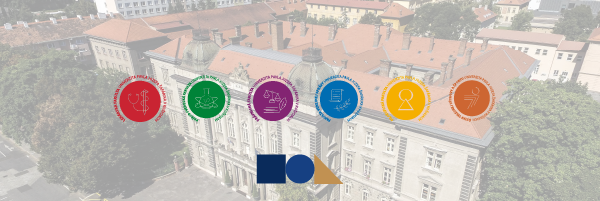SIGNIFICANT INFRASTRUCTURE
P. J. ŠAFÁRIK UNIVERSITY IN KOŠICE, Technology and Innovation Park, Center for Interdisciplinary Biosciences (CIB TIP-UPJS)
Center for Interdisciplinary Biosciences at TIP-UPJS has high-tech experimental equipment at its disposal. The infrastructure of CIB TIP-UPJS has been upgraded in the last 5 years due to participation in the projects of EU structural Funds and 7. FP EU. In total, above 2.5 million EUR has been invested in the new instruments and infrastructure of CIB TIP-UPJS. There are in disposition 13 very well-equipped laboratories. The equipment is mostly used for protein science and functional imaging achieved via advanced methods of fluorescence-based (FLIM, FRET, FRAP, FCS, optical imaging) and Raman micro-spectroscopy imaging, and micromanipulation (optical tweezers). Further, advanced instruments of differential scanning and isothermal titration calorimetry are available as well. As part of the CasProt project, this workplace will provide also other advanced techniques, especially those connected with work in the field of directed evolution of protein, single-molecule biophysics, cell and molecular biophysics.
Laboratory of Protein Engineering
Laboratory of Laser Spectroscopy
Laboratory of Biothermodynamics and Optical Spectroscopy
UNIVERSITY OF ZÜRICH (UZH), Department of Biochemistry
The Plückthun lab (Department of Biochemistry, Universität Zürich) has carried out pioneering work in protein engineering, making seminal contributions to the development of the recombinant antibody technology (development of the first bacterial expression system, design of the first fully synthetic antibody library, the development of ribosome display). More recently, the group developed the DARPin technology as a new scaffold, which is now in clinical trials, and evolution technology to make stable membrane proteins for drug discovery and structural biology. The core expertise is protein engineering in all aspects, from computer design, molecular biology, directed evolution, biophysical characterization, cell culture and tumour targeting, using animal models.
TECHNICAL UNIVERSITY OF MUNICH (TUM), Department of Physics, Biophysics E22
The Rief lab (Molecular and cellular biophysics, Technische Universität München) has carried out pioneering work in single-molecule biophysics, making seminal contributions to the application of force spectroscopy (atomic force spectroscopy and optical tweezers to study nano-mechanics of biomolecules). The lab has created a vibrant environment for open collaborations between physicists, chemists and biologists. The core expertise is single- molecule force spectroscopy in all aspects, from protein design and engineering, molecular biology, microsphere functionalisation, development of single-molecule assays, mathematical analysis, laser optics and custom-made instrument development including software and electronics.







